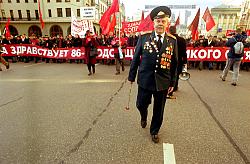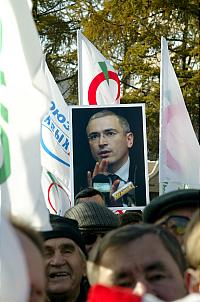 |
|
Alexandra Kocho-schellenberg /
For MT
Communists marching on Lubyanskaya
Ploshchad on Friday, the anniversary of the 1917 October Revolution.
The day is now known as the Day of Accord and Reconciliation. |
The hammer-and-sickle flag fluttered briefly on top of the State Duma on
Friday, replacing the Russian tricolor, which floated down to Okhotny Ryad
where thousands of Communist supporters marched by.
But 20 minutes later, the Duma's new colors had been hauled down again
by police, reminding marchers that the event was simply an anniversary
of the 1917 Revolution, not a real attempt to shake the world.
The occasion coincided with the start of political parties' campaigns
for the Duma's 450 seats, as they held a series of competing rallies that
variously celebrated, protested or simply ignored the 86th anniversary
of the Bolshevik Revolution.
The holiday, formerly Revolution Day but now renamed The Day of Accord
and Reconciliation, was kicked off in traditional style with a Red Square
march by hundreds of World War II veterans, cadets and soldiers.
While Communist Party supporters marched, armed with red banners and
slogans that included "Down With the Bourgeoisie," in Pushkin
Square the liberal parties Union of Right Forces, or SPS, and Yabloko
protested the jailing of Yukos boss Mikhail Khodorkovsky.
Not to be outdone, leaders of pro-Kremlin United Russia, apparently
buoyed by polls putting it ahead of its rivals, held three events, all
aimed at associating the party with national unity -- and all studiously
avoided mentioning either the events of 1917, or Khodorkovsky.
 |
|
Igor Tabakov / MT
A picture of Mikhail Khodorkovsky
at a Yabloko and SPS rally on Pushkin Square. |
Their Red Square memorial was a page from the prerevolutionary history
books, to the defenders of Moscow against a 1612 Polish invasion. On the
other side of the Kremlin, the party's pop concert at Vasilyevsky Spusk
had young people dancing in front of a stage proclaiming "Together
We Must Make Russia United, Strong." Meanwhile, party leader and
Interior Minister Boris Gryzlov used a party congress at the Moscow International
House of Music, or MMDM, to belittle opposition parties and emphasize
the Kremlin's investment in social expenditures.
Political campaigning and protests against Khodorkovsky's arrest and
against the oligarchs overshadowed the official Nov. 7 parade, which organizers
said included 130 surviving veterans of the Nov. 7, 1941, Revolution Day
parade. That day, soldiers marched straight from Red Square to trains
taking them to the front.
"That parade was really a historic event, because it was an indicator
of the will of the people to defend their country," Moscow Mayor
Yury Luzhkov told the parade, estimated at about 15,000.
But this Nov. 7, unreconciled participants went their own separate ways
after the parade.
United Russia's leaders pitched a message of being the strongest political
force. "The United Russia party is the most powerful to emerge in
our country since the fall of the Soviet Union," Gryzlov told an
audience of 1,300.
Gryzlov said the party had decided not to take part in television debates
because the rest of the parties running for the Duma had "no political
weight."
"For parties with no political weight at all, taking part in the
debates with United Russia is the same as a substitute goalkeeper of a
street hockey team posing for a photograph along with [Soviet-era hockey
legend Vladislav] Tretyak," Gryzlov said.
Gryzlov outlined the party's main goals as the continuation of the government's
economic reforms and fighting corruption and red tape.
The Communists bolstered their rally with the presence of Aleida Guevara,
the daughter of the famed revolutionary Che Guevara, who spoke to an estimated
crowd of 6,500 through a translator.
 |
|
Alexandra Kocho-Schellenberg /
For MT
|
Communist Party leader Gennady Zyuganov
condemned "oligarchic capitalism," and in his clearest reference
to the Yukos affair said that "a new redistribution of property"
was underway.
A more Yukos-friendly crowd of about 1,500 gathered at a smaller rally
on Pushkin Square organized by SPS and Yabloko, which both have received
funding from Khodorkovsky. But at the rally the parties showed no sign
of being any closer to a merger, proposed last week by SPS co-leader Anatoly
Chubais.
Some demonstrators carried Yukos pennants and photographs of Khodorkovsky,
or wore T-shirts emblazoned with a Yukos logo and the slogan "For
our freedom and yours." One placard read, "The Khodorkovsky
affair is the prosecutor's shame," while other slogans condemned
the war in Chechnya.
Yabloko leader Grigory Yavlinsky
said democracy in Russia was under threat, but avoided mentioning Khodorkovsky
by name.
"Corruption is devouring the country. Our children will not forgive
this," Yavlinsky said. "We want to see Russia transformed into
a liberal and European country."
SPS co-leader Boris Nemtsov used the occasion to remind supporters of
the liberal parties, which have traditionally struggled past the 5 percent
barrier to enter the Duma, to get out the vote next month.
"Whatever you do, do not stay at home ... because that is a vote
for the bureaucracy, and a vote against freedom," he said.
See also:
the original at
www.themoscowtimes.com
YUKOS Case
|